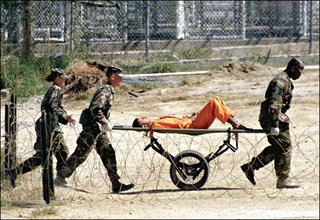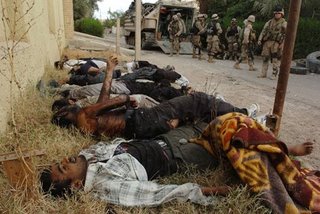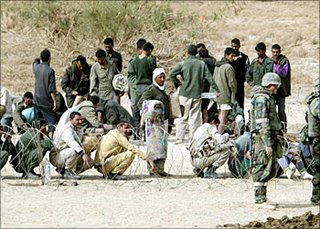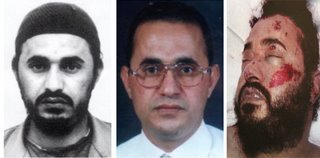
De New York Times: 'Deaths at Guantánamo.
The news that three inmates at Guantánamo Bay, Cuba, hanged themselves should not have surprised anyone who has paid attention to the twisted history of the camp that President George W. Bush built for selected prisoners from Afghanistan and antiterrorist operations. It was the inevitable result of creating a netherworld of despair beyond the laws of civilized nations, where men were to be held without any hope of decent treatment, impartial justice or, in so many cases, even eventual release.
It is a place where secret tribunals sat in judgment of men whose identities they barely knew and who were not permitted to see the evidence against them. Inmates were abused, humiliated, tormented and sometimes tortured. Some surely are very dangerous men, committed to a life of terrorism and deserving of harsh justice. But only 10 of the roughly 465 men at the camp have been charged with crimes. The others, according to senior officers who served there, were foot soldiers of the Taliban or men who just happened to live in a country invaded by the United States after the 9/11 attacks.
Inmates at Guantánamo Bay have tried seeking help from the American courts, and one case has reached the Supreme Court. But most of these appeals were thwarted by claims of national security. Any new appeals will fall under a shocking new law that deprives the inmates of the centuries- old right to challenge their imprisonment. Government lawyers have even tried to use that law retroactively, to dismiss all pending appeals.
Guantánamo and other American detention centers have sparked outrage around the world, deeply harming America's image as the defender of humanity against just these sorts of abuses. Last month a UN panel called for the prisons to be shut down. The administration's response to all of this has been defiance.
When dozens of inmates went on hunger strikes last year, the authorities strapped them into metal "restraint chairs" and ordered doctors to force-feed them. Military officials said they did this only to inmates on the brink of death, but The New York Times has reported that the restraint chair was used on all hunger strikers, regardless of their condition.
Medical groups were overwhelmingly appalled by this practice, but the Pentagon issued new rules this month reaffirming that military doctors can be ordered to force-feed prisoners. The only role for psychiatrists at Guantánamo seems to be to help prepare prisoners for interrogation.
So it was not surprising in the least when inmates attempted suicide. Twenty-three tried to kill themselves over eight days in August 2003, but the military covered it up for 18 months. Now, three inmates have succeeded. Camp officials say one was a mid- or high-level Al Qaeda operative. One was captured in Afghanistan (doing what, we don't know), and the other was from something the camp commander, Rear Admiral Harry Harris Jr., called a splinter group.
Harris's response was as appalling as the suicides. "I believe this was not an act of desperation, but an act of asymmetrical warfare waged against us," he said. The inmates, he said, "have no regard for life, neither ours nor their own."
These comments reveal a profound disassociation from humanity. They say more about why Guantánamo Bay should be closed than any UN report ever could.
The news that three inmates at Guantánamo Bay, Cuba, hanged themselves should not have surprised anyone who has paid attention to the twisted history of the camp that President George W. Bush built for selected prisoners from Afghanistan and antiterrorist operations. It was the inevitable result of creating a netherworld of despair beyond the laws of civilized nations, where men were to be held without any hope of decent treatment, impartial justice or, in so many cases, even eventual release.
It is a place where secret tribunals sat in judgment of men whose identities they barely knew and who were not permitted to see the evidence against them. Inmates were abused, humiliated, tormented and sometimes tortured. Some surely are very dangerous men, committed to a life of terrorism and deserving of harsh justice. But only 10 of the roughly 465 men at the camp have been charged with crimes. The others, according to senior officers who served there, were foot soldiers of the Taliban or men who just happened to live in a country invaded by the United States after the 9/11 attacks.
Inmates at Guantánamo Bay have tried seeking help from the American courts, and one case has reached the Supreme Court. But most of these appeals were thwarted by claims of national security. Any new appeals will fall under a shocking new law that deprives the inmates of the centuries- old right to challenge their imprisonment. Government lawyers have even tried to use that law retroactively, to dismiss all pending appeals.
Guantánamo and other American detention centers have sparked outrage around the world, deeply harming America's image as the defender of humanity against just these sorts of abuses. Last month a UN panel called for the prisons to be shut down. The administration's response to all of this has been defiance.
When dozens of inmates went on hunger strikes last year, the authorities strapped them into metal "restraint chairs" and ordered doctors to force-feed them. Military officials said they did this only to inmates on the brink of death, but The New York Times has reported that the restraint chair was used on all hunger strikers, regardless of their condition.
Medical groups were overwhelmingly appalled by this practice, but the Pentagon issued new rules this month reaffirming that military doctors can be ordered to force-feed prisoners. The only role for psychiatrists at Guantánamo seems to be to help prepare prisoners for interrogation.
So it was not surprising in the least when inmates attempted suicide. Twenty-three tried to kill themselves over eight days in August 2003, but the military covered it up for 18 months. Now, three inmates have succeeded. Camp officials say one was a mid- or high-level Al Qaeda operative. One was captured in Afghanistan (doing what, we don't know), and the other was from something the camp commander, Rear Admiral Harry Harris Jr., called a splinter group.
Harris's response was as appalling as the suicides. "I believe this was not an act of desperation, but an act of asymmetrical warfare waged against us," he said. The inmates, he said, "have no regard for life, neither ours nor their own."
These comments reveal a profound disassociation from humanity. They say more about why Guantánamo Bay should be closed than any UN report ever could.' Lees verder:
http://www.iht.com/articles/2006/06/12/opinion/edguan.php



































